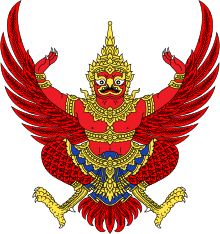Ministry of Labour (Thailand)
| กระทรวงแรงงาน | |
| Agency overview | |
|---|---|
| Jurisdiction | Government of Thailand |
| Minister responsible |
|
| Website | www.mol.go.th |
The Ministry of Labour (Thai: กระทรวงแรงงาน, rtgs: Krasuang Raeng Ngan; Abrv: MOL), is a Thai government body responsible for the oversight of labour administration and protection, skill development, and the promotion of employment in Thailand.
Organisation
Article 35 of the Act on Reorganization of Ministries, Ministerial Bureaus and Departments, B.E.2545 (2002) established the following MOL structure:[1]
- Office of the Minister
- Office of the Permanent Secretary
- Department of Employment
- Department of Skill Development
- Department of Labour Protection and Welfare
- Office of Social Security
Somewhere in the mix of departments is the Office of Foreign Workers Administration.[2]
Jobs prohibited to foreigners
Foreigners are not permitted to work in the following occupations:[3]
- Labour work except work on fishing boats.
- Agriculture, animal husbandry, forestry or fishery, except work requiring specialized knowledge, farm supervision, or labour on fishing boats, particularly marine fishery.
- Bricklaying, carpentry, or other construction work.
- Wood carving.
- Driving motor vehicles or vehicles which do not use machinery or mechanical devices, except piloting aircraft internationally.
- Front shop sales and auction sale work.
- Supervising, auditing, or giving service in accountancy, except occasional internal auditing.
- Cutting or polishing precious or semi-precious stones.
- Haircutting, hairdressing, or beautification.
- Cloth weaving by hand.
- Mat weaving or making utensils from reed, rattan, jute, hay, or bamboo.
- Making rice paper by hand.
- Lacquer work.
- Making Thai musical instruments.
- Niello work.
- Goldsmith, silversmith, or gold/copper alloy smith work.
- Stone work.
- Making Thai dolls.
- Making mattresses or quilts.
- Making alms bowls.
- Making silk products by hand.
- Making Buddha images.
- Knife making.
- Making paper or cloth umbrellas.
- Making shoes.
- Making hats.
- Brokerage or agency except in international trading.
- Professional civil engineering concerning design and calculation, systemization, analysis, planning, testing, construction supervision, or consulting services, excluding work requiring specialized techniques.
- Professional architectural work concerning design, drawing/making, cost estimation, or consulting services.
- Dressmaking.
- Pottery.
- Cigarette rolling by hand.
- Tour guiding or conducting.
- Hawking of goods and Thai typesetting by hand.
- Unwinding and twisting silk by hand.
- Clerical or secretarial work.
- Legal services or engaging in legal work, except arbitration work. Work relating to defense of cases at arbitration level, provided the law governing the dispute under consideration by the arbitrators is not Thai law, or it is a case where there is no need to apply for the enforcement of such arbitration award in Thailand.
References
- ↑ "MOL Duties". Ministry of Labour. Retrieved 27 July 2016.
- ↑ Chalamwong, Yongyuth; Chaladsook, Alongkorn (27 July 2016). "End Thailand's relaxed labour laws". Bangkok Post. Retrieved 27 July 2016.
- ↑ "Prohibited Jobs for Foreigners in Thailand". Isaan Lawyers. Retrieved 14 April 2016.
External links
- Ministry of Labour - Official Website in Thai
- Ministry of Labour - Official Website in English
- Prohibited Occupations in Thailand
This article is issued from Wikipedia - version of the 7/27/2016. The text is available under the Creative Commons Attribution/Share Alike but additional terms may apply for the media files.
